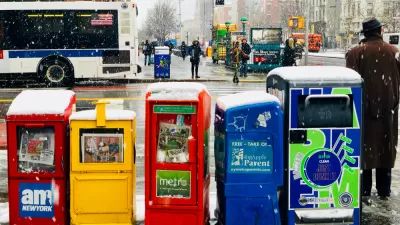Reading news stories about planning is crucially important to the worth of planners, developers, public officials, policy makers, and anyone else who cares about the way communities form and evolve. By knowing what's going on in other places, those concerned with cities and their development will be better informed to analyze and approach the planning issues facing their own communities.
Reading news stories about planning is crucially important to the worth of planners, developers, public officials, policy makers, and anyone else who cares about the way communities form and evolve. By knowing what's going on in other places, those concerned with cities and their development will be better informed to analyze and approach the planning issues facing their own communities. The more we know about the wide variety of planning issues, the better we'll be able to address them.
But it can be assured that some would argue that the relative importance of most planning news is insignificant, as the practice of planning is primarily place-based; specific plans address specific issues in specific places. This might lead some to believe that an issue or problem being faced in a city 500 miles away really doesn't have a lot to do with what's going on at home. But while the specifics of the problem and solution might be completely irrelevant to anyone outside the community in question, it is almost a guarantee that the basis of this planning issue is one that could present itself in any city across the country.
Whether it's a story about a plan to build a large housing development or a revived interest in abandoned industrial areas or a proposal for new transit technology, core issues are being addressed in news stories that have a kind of universal planning relevance. It is in the best interest of the concerned planning community to acknowledge the "local angle" of these news stories because it allows us to learn from the mistakes and successes of others, and to find a way to relate them back to our own communities. Just as doctors need to stay current on the latest medical studies and medications, planners must constantly keep their ears open to news and information about new projects or planning issues being faced in other communities. Like a doctor would diagnose a patient, it is the vital role of planners to make use of all the available information to help their communities understand and address the issues facing them. .
It almost goes without saying that this is a big world. There's a whole lot of planning going on at any given time. Now more than ever before, we have incredibly easy access to planning news stories and the lessons the have to teach. The Internet has opened the doors to a new kind of planning education -- one in a constant state of evolutionary adaptation to the new information and examples provided by media coverage of planning in action. Any planners who think their education days ended when they got that B.A., M.A., or AICP is doing a disservice to those they serve. Planning news offers an endless opportunity to expand one's expertise, improve their usefulness to their community, and spark their curiosity.
And, yes, we all can admit that planning is place-based. But it is also a practice that is firmly based upon the principle of improving communities and cities for the benefit of all. The importance of this principle is apparent in every news story about planning, no matter what the dateline says.

Manufactured Crisis: Losing the Nation’s Largest Source of Unsubsidized Affordable Housing
Manufactured housing communities have long been an affordable housing option for millions of people living in the U.S., but that affordability is disappearing rapidly. How did we get here?

Americans May Be Stuck — But Why?
Americans are moving a lot less than they once did, and that is a problem. While Yoni Applebaum, in his highly-publicized article Stuck, gets the reasons badly wrong, it's still important to ask: why are we moving so much less than before?

Using Old Oil and Gas Wells for Green Energy Storage
Penn State researchers have found that repurposing abandoned oil and gas wells for geothermal-assisted compressed-air energy storage can boost efficiency, reduce environmental risks, and support clean energy and job transitions.

Updating LA’s Tree Rules Could Bring More Shade to Underserved Neighborhoods
A new USC study finds that relaxing Los Angeles’ outdated tree planting guidelines could significantly expand urban tree canopy and reduce shade disparities in lower-income neighborhoods, though infrastructure investments are also needed.

California's Canal Solar Projects Aim to Conserve Resources and Expand Clean Energy
California’s Project Nexus has begun generating electricity from solar panels installed over irrigation canals, with researchers and state agencies exploring statewide expansion to conserve water and boost clean energy production.

HHS Staff Cuts Gut Energy Assistance Program
The full staff of a federal program that distributes heating and cooling assistance for low-income families was laid off, jeopardizing the program’s operations.
Urban Design for Planners 1: Software Tools
This six-course series explores essential urban design concepts using open source software and equips planners with the tools they need to participate fully in the urban design process.
Planning for Universal Design
Learn the tools for implementing Universal Design in planning regulations.
Heyer Gruel & Associates PA
City of Moreno Valley
Institute for Housing and Urban Development Studies (IHS)
City of Grandview
Harvard GSD Executive Education
Salt Lake City
NYU Wagner Graduate School of Public Service
City of Cambridge, Maryland





























